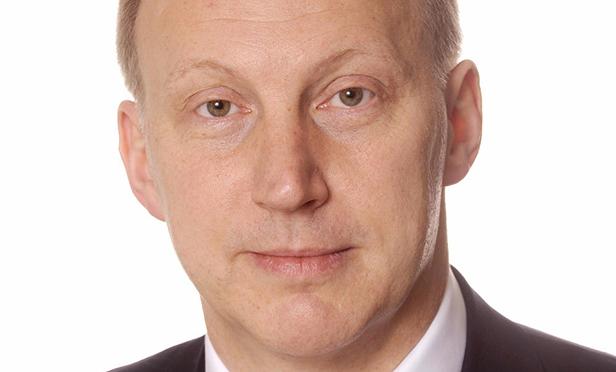Linklaters Managing Partner Slams NQ Pay War
Gideon Moore appears to have taken aim at Freshfields by asking what exactly those who started the war expected to achieve.
July 12, 2019 at 04:41 AM
3 minute read
Linklaters managing partner Gideon Moore has expressed his firm's frustration with the industry's pay war, which has caused almost every top U.K. firm to increase newly qualified lawyer remuneration packages to £100,000 or more.
Moore, who was re-elected for a second term as managing partner in March, told Legal Week: "If there are future hikes, they won't be coming from Linklaters."
Seemingly taking aim at arch rival Freshfields Bruckhaus Deringer, which sparked the pay war among U.K. firms back in May, Moore commented: "You have to ask the people who started this process what exactly they expected to achieve from it."
Linklaters was the last Magic Circle firm to follow suit, which Moore claimed was "for good reason".
He said: "This was because a) we didn't need it and b) if we were to follow it, we wanted it to be for reasons we understood."
However, he added that the firm would always look to remain competitive in the market for talent.
"At the end of the day, what we felt we couldn't do was give ourselves and the talent who join a reason not to prioritise us over our immediate competitors."
In response, Freshfields released a statement saying: "Our decision to increase associate salaries with effect from May 1 reflects our continued commitment to attracting and retaining the very best talent in the legal market.
"Our pay offering is a critical part of our talent strategy and we regularly review our compensation and benefits across the firm with this in mind."
The ongoing pay war has affected multiple tiers of the legal industry. Magic Circle firms including Clifford Chance, Allen & Overy and Slaughter and May have all raised their salaries to more than £100,000 including bonuses, while other leading UK law firms such as Ashurst and Simmons & Simmons have more recently followed suit.
Even within the mid-market, firms such as Pinsent Masons and Stephenson Harwood have also hiked salaries to £72,500 and £75,000 respectively as a result of stiff competition.
However, Moore's comments reflect growing discontentment at a variety of firms over the change, with many privately complaining that the rises were neither welcome nor necessary. But others say Freshfields was simply responding to the rates paid by U.S. firms in London, which remain a long way ahead.
This content has been archived. It is available through our partners, LexisNexis® and Bloomberg Law.
To view this content, please continue to their sites.
Not a Lexis Subscriber?
Subscribe Now
Not a Bloomberg Law Subscriber?
Subscribe Now
NOT FOR REPRINT
© 2025 ALM Global, LLC, All Rights Reserved. Request academic re-use from www.copyright.com. All other uses, submit a request to [email protected]. For more information visit Asset & Logo Licensing.
You Might Like
View All

Trio of Firms Act On Chinese Insurer Ping An's $1.7B Stake Acquisition In Healthcare Arm

King & Spalding’s Merger Marks Key Move in Saudi Arabia’s Legal Surge
3 minute read
RBG Holdings Suspends Trading After Weeks of Internal Strife and Financial Struggles
Trending Stories
- 1Law Firms Report Wide Growth, Successful Billing Rate Increases and Less Merger Interest
- 2CLOs Face Mounting Pressure as Risks Mushroom and Job Duties Expand
- 3X Faces Intense Scrutiny as EU Investigation Races to Conclusion & Looming Court Battle
- 4'Nation Is in Trouble': NY Lawmakers Advance Bill to Set Parameters for Shielding Juror IDs in Criminal Matters
- 5Margolis Edelstein Broadens Leadership With New Co-Managing Partner
Who Got The Work
J. Brugh Lower of Gibbons has entered an appearance for industrial equipment supplier Devco Corporation in a pending trademark infringement lawsuit. The suit, accusing the defendant of selling knock-off Graco products, was filed Dec. 18 in New Jersey District Court by Rivkin Radler on behalf of Graco Inc. and Graco Minnesota. The case, assigned to U.S. District Judge Zahid N. Quraishi, is 3:24-cv-11294, Graco Inc. et al v. Devco Corporation.
Who Got The Work
Rebecca Maller-Stein and Kent A. Yalowitz of Arnold & Porter Kaye Scholer have entered their appearances for Hanaco Venture Capital and its executives, Lior Prosor and David Frankel, in a pending securities lawsuit. The action, filed on Dec. 24 in New York Southern District Court by Zell, Aron & Co. on behalf of Goldeneye Advisors, accuses the defendants of negligently and fraudulently managing the plaintiff's $1 million investment. The case, assigned to U.S. District Judge Vernon S. Broderick, is 1:24-cv-09918, Goldeneye Advisors, LLC v. Hanaco Venture Capital, Ltd. et al.
Who Got The Work
Attorneys from A&O Shearman has stepped in as defense counsel for Toronto-Dominion Bank and other defendants in a pending securities class action. The suit, filed Dec. 11 in New York Southern District Court by Bleichmar Fonti & Auld, accuses the defendants of concealing the bank's 'pervasive' deficiencies in regards to its compliance with the Bank Secrecy Act and the quality of its anti-money laundering controls. The case, assigned to U.S. District Judge Arun Subramanian, is 1:24-cv-09445, Gonzalez v. The Toronto-Dominion Bank et al.
Who Got The Work
Crown Castle International, a Pennsylvania company providing shared communications infrastructure, has turned to Luke D. Wolf of Gordon Rees Scully Mansukhani to fend off a pending breach-of-contract lawsuit. The court action, filed Nov. 25 in Michigan Eastern District Court by Hooper Hathaway PC on behalf of The Town Residences LLC, accuses Crown Castle of failing to transfer approximately $30,000 in utility payments from T-Mobile in breach of a roof-top lease and assignment agreement. The case, assigned to U.S. District Judge Susan K. Declercq, is 2:24-cv-13131, The Town Residences LLC v. T-Mobile US, Inc. et al.
Who Got The Work
Wilfred P. Coronato and Daniel M. Schwartz of McCarter & English have stepped in as defense counsel to Electrolux Home Products Inc. in a pending product liability lawsuit. The court action, filed Nov. 26 in New York Eastern District Court by Poulos Lopiccolo PC and Nagel Rice LLP on behalf of David Stern, alleges that the defendant's refrigerators’ drawers and shelving repeatedly break and fall apart within months after purchase. The case, assigned to U.S. District Judge Joan M. Azrack, is 2:24-cv-08204, Stern v. Electrolux Home Products, Inc.
Featured Firms
Law Offices of Gary Martin Hays & Associates, P.C.
(470) 294-1674
Law Offices of Mark E. Salomone
(857) 444-6468
Smith & Hassler
(713) 739-1250









